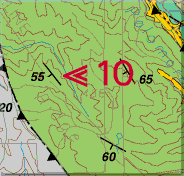I've never gone on strike before, but after much deliberation, I decided I would take part in the current UCU industrial action against proposed changes to the USS university staff pension scheme.
The biggest thing I worried about was the impact on our students. I love teaching, and I was particularly looking forward to my new lectures and practicals in the Earth Evolution module. I was particularly looking forward to running my trilobite phylogeny practical, Sex In Bugs In Rock Enrolled.
Then some archaeological friends in York started talking about teach-outs, and I thought they sounded like a great idea. It soon turned out that my local UCU branch was organizing them, so I proposed 'Strike and Dip: a geological teach-out'. I didn't quite know what I was going to talk about, but in the end it became academic, as meteorology trumped geology.
So, for those millions of people who didn't get to hear me ramble in a pub, here's what I was planning to talk about, under a vaguely geo-political theme.
Firstly, I need to explain my placard slogan. Strike and dip is the term for measuring the orientation and magnitude of a tilted plane. Think of it as a spirit level for checking whether your continental shelves have been installed correctly. Searching for 'geology strike' online will bring you lots of hits on this subject, and nothing about geologists going on strike.
This didn't surprise me, but it did get me thinking. Not only have I never gone on strike before, but I can't recall a time when many (any?) of my geological colleagues have gone on strike either. Do geologists not go on strike? Are geologists less political than other people? I don't think so, but chatting to a couple of friends about the strike, they indicated that their attitude was affected by their experience of the 1984-85 coal strike in Yorkshire. The failure of that industrial action had led them to conclude that strikes didn't work.
Ironically, of course, these strikes were ultimately geological. Even more ironically, Margaret Thatcher was able to come out on top because her government was financially buoyed by North Sea oil (1984-85 being the most lucrative year). One fossil fuel used to destroy another: the Jurassic triumphing over the Carboniferous.
This sort of geo-politics is something we really need to talk about more. We need broader discussions and greater understanding of society's deep geological roots. As the old adage goes: if you can't grow it, it has to be mined. Someone should organize a teach-out...
Until then, I leave you with Steven Dutch's research which showed why Cretaceous plankton led people in the US South to vote Democrat in the 2000 Presidential Election.
 |
| Geology: where only dip is normally inclined to strike. |
The biggest thing I worried about was the impact on our students. I love teaching, and I was particularly looking forward to my new lectures and practicals in the Earth Evolution module. I was particularly looking forward to running my trilobite phylogeny practical, Sex In Bugs In Rock Enrolled.
Keep your silly ways
Then some archaeological friends in York started talking about teach-outs, and I thought they sounded like a great idea. It soon turned out that my local UCU branch was organizing them, so I proposed 'Strike and Dip: a geological teach-out'. I didn't quite know what I was going to talk about, but in the end it became academic, as meteorology trumped geology.
So, for those millions of people who didn't get to hear me ramble in a pub, here's what I was planning to talk about, under a vaguely geo-political theme.
Firstly, I need to explain my placard slogan. Strike and dip is the term for measuring the orientation and magnitude of a tilted plane. Think of it as a spirit level for checking whether your continental shelves have been installed correctly. Searching for 'geology strike' online will bring you lots of hits on this subject, and nothing about geologists going on strike.
 | ||
| The long line is the strike line and shows the direction in which the bed is horizontal. The short line is the dip line, and shows which direction the bed is tilting, and the magnitude, in degrees (US Geological Survey). |
This didn't surprise me, but it did get me thinking. Not only have I never gone on strike before, but I can't recall a time when many (any?) of my geological colleagues have gone on strike either. Do geologists not go on strike? Are geologists less political than other people? I don't think so, but chatting to a couple of friends about the strike, they indicated that their attitude was affected by their experience of the 1984-85 coal strike in Yorkshire. The failure of that industrial action had led them to conclude that strikes didn't work.
Ironically, of course, these strikes were ultimately geological. Even more ironically, Margaret Thatcher was able to come out on top because her government was financially buoyed by North Sea oil (1984-85 being the most lucrative year). One fossil fuel used to destroy another: the Jurassic triumphing over the Carboniferous.
 |
| Fossil fuel consumption in the UK (Wikimedia Commons). |
This sort of geo-politics is something we really need to talk about more. We need broader discussions and greater understanding of society's deep geological roots. As the old adage goes: if you can't grow it, it has to be mined. Someone should organize a teach-out...
Until then, I leave you with Steven Dutch's research which showed why Cretaceous plankton led people in the US South to vote Democrat in the 2000 Presidential Election.
Comments